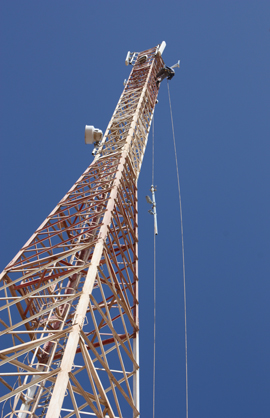Launched in 2007, the North Atlantic Treaty Organization co-funded Science for Peace “Sahara Trade Winds to Hydrogen: Applied Research for Sustainable Energy Systems" Project deployed applied research platforms within Morocco and Mauritania's main universities and research centers. Carried out in partnership with regional end-user groups, the project initiated a far ranging, comprehensive program aimed at integrating intermittent sources of renewable energies in the weak grid infrastructure of the Saharan/Sahel region. Equipping these platforms in Morocco and Mauritania in the first months of the program enabled field measurements to be geographically spread. Extending this cooperation to other countries in the region is currently being considered. Indeed, countries like Senegal, Mali, Niger and Chad dispose of extremely limited electric generating capacities with a need to cover vast territories.
Carried out in partnership with regional end-user groups, the project initiated a far ranging, comprehensive program aimed at integrating intermittent sources of renewable energies in the weak grid infrastructure of the Saharan/Sahel region. Equipping these platforms in Morocco and Mauritania in the first months of the program enabled field measurements to be geographically spread. Extending this cooperation to other countries in the region is currently being considered. Indeed, countries like Senegal, Mali, Niger and Chad dispose of extremely limited electric generating capacities with a need to cover vast territories.
The trade winds that blow along the Atlantic coast from Morocco to Senegal represent one of the largest and most productive wind potentials available on earth. Because of the erratic nature of winds, however, wind electricity cannot be integrated locally on any significant scale, unless mechanisms are developed for storing these intermittent renewable energies. Wind-electrolysis for the production of hydrogen can be used in grid stabilization, as power storage, fuel or chemical feedstock in specific industries. Initiated by industry, this project is end-user driven and seeks to demonstrate the potential for synergies emerging from sustainable carbon-free energy technologies and their related economies. The utilization of wind energy and electrolysis bi-products is likely to reinforce significantly the value added processing of Morocco and Mauritania’s main extractive mining industries (Phosphates and Iron-ore respectively) in providing most environmentally friendly solutions.
Tackling the consequences of climate change, environmental degradation and rampant desertification on largely agricultural based societies currently under high demographic pressure is a key social priority, as they generate economic distress. This can lead to mass migration, which constitutes a significant security threat to the stability of the region and that of NATO countries.
Developing alternative wind energy solutions to feed smaller electricity markets are essential for solving decentralized energy access issues and enable the development of local, viable industries. These can address employment and economic challenges that the region's is currently faced with, besides the additional social pressure exerted from Sub-Saharan migrant populations.
The involvement of NATO to assist local academia to support, sensitize and train capacities necessary to develop upstream renewable energy alternatives is relevant to the Alliance’s strategic challenges. Besides reinforcing collaborative mechanisms with its Mediterranean dialogue partners, the objective of NATO is to support the development of cleaner technologies that can address energy security and the need to diversify away from fossil fuels.



